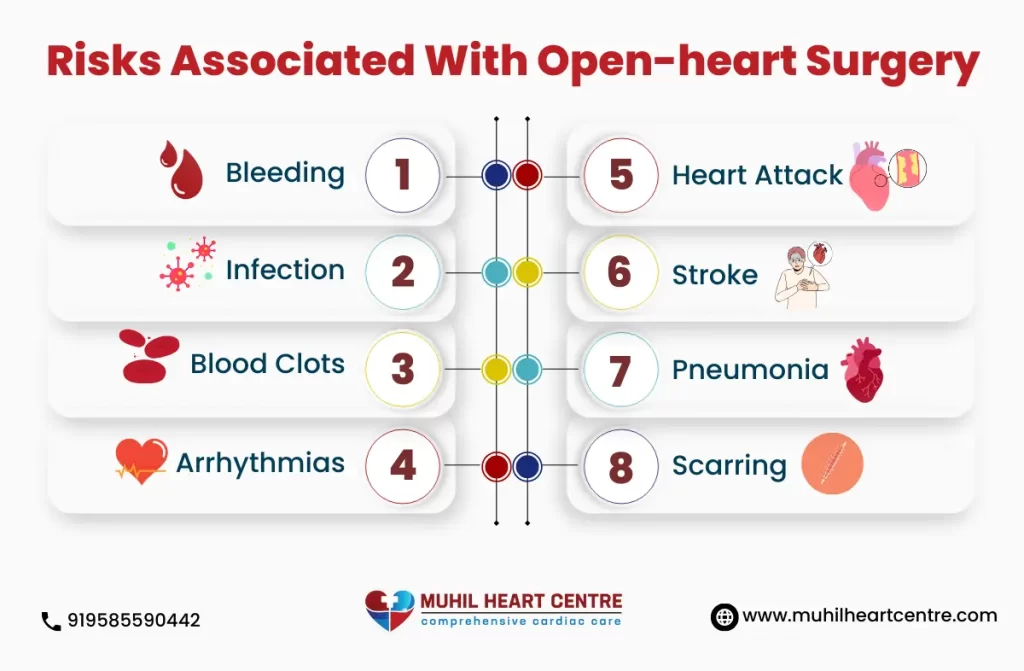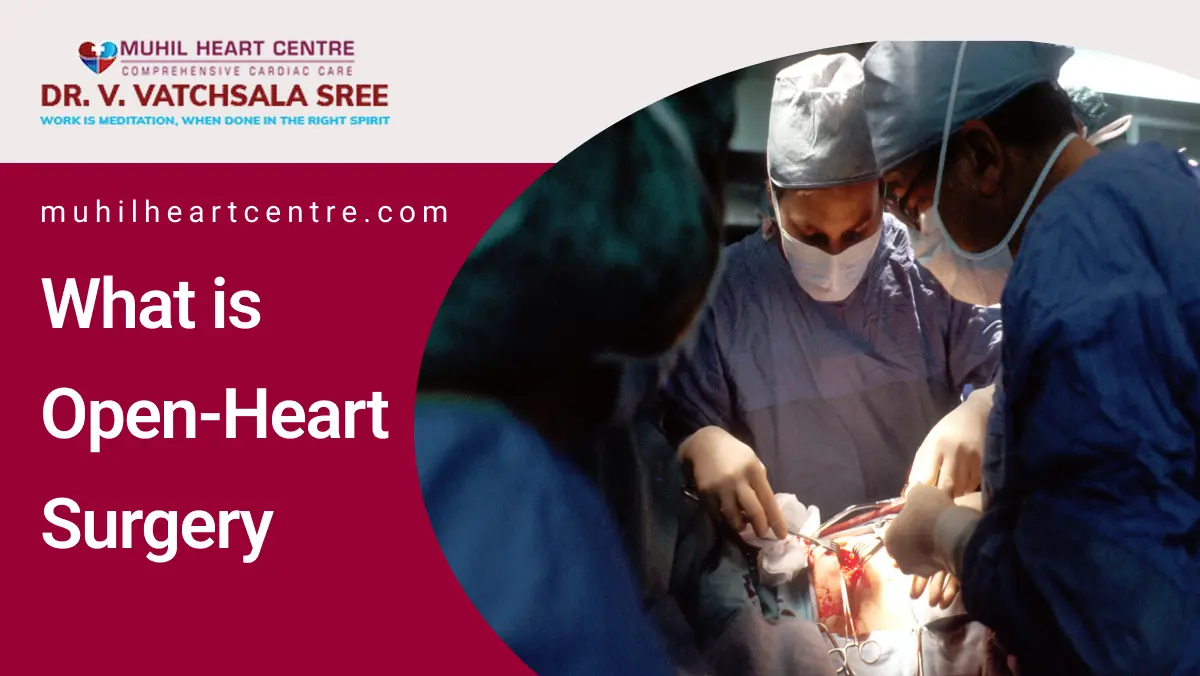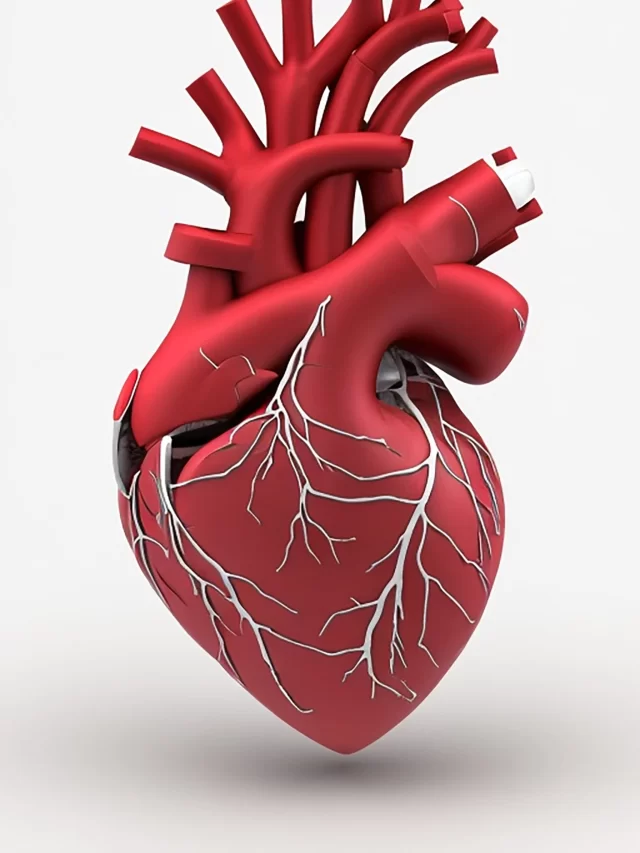Open-heart surgery also known as cardiac surgery is a complex and life-saving medical procedure that involves the surgical manipulation of the heart or major blood vessels. This type of surgery is typically performed to treat various heart conditions and is often a last resort when other treatments have proven ineffective. In this blog post, we will delve into the details on what is open-heart surgery? the need for open-heart surgery, the common conditions it addresses, and the intricacies of the procedure.

What is Open-Heart Surgery?
Open-heart surgery is a highly specialized medical procedure performed to address severe heart conditions. It becomes necessary when alternative treatments prove ineffective. Common reasons for open-heart surgery include coronary artery disease, heart valve disease, congenital heart defects, aortic aneurysms, and heart transplants.
The surgery involves anesthetizing the patient, making an incision in the chest, temporarily redirecting blood flow through a heart-lung machine, and repairing or replacing damaged heart structures. Open-heart surgery is a life-saving intervention that significantly improves heart function and extends the lives of patients with critical cardiac issues making the cost of open-heart surgery reasonable.
Why is Open-Heart Surgery Needed?
Open-heart surgery is necessary when a person’s heart or blood vessels have developed severe problems that cannot be managed with less invasive treatments. The primary reasons for knowing what is open-heart surgery and why it is essential include:
Coronary Artery Disease (CAD)
CAD occurs when the coronary arteries, which supply blood to the heart muscle, become narrowed or blocked due to the accumulation of fatty deposits or plaques. This condition can lead to chest pain (angina) and increases the risk of a heart attack. Open-heart surgery, often in the form of coronary artery bypass grafting (CABG), can bypass the blocked arteries with healthy blood vessels, restoring blood flow to the heart.
Heart Valve Disease
Heart valves ensure the one-way flow of blood through the heart. When these valves become diseased or damaged (as in conditions like aortic stenosis or mitral regurgitation), open-heart surgery may be needed to repair or replace the affected valves with prosthetic ones.
Inherent Heart Imperfections
A few people are brought into the world with underlying irregularities in their heart, known as innate heart deserts. When considering what is open-heart surgery, it is often necessary to know that this procedure aids in repairing these defects, allowing the heart to function properly.
Aortic Aneurysm
An aortic aneurysm occurs when a section of the aorta (the main artery carrying blood from the heart) weakens and bulges. This can be life-threatening if the aneurysm ruptures. Surgical repair, such as aortic aneurysm repair, may be required to prevent a rupture.
Heart Transplant
In cases of severe heart failure when other treatments have failed, a heart transplant may be the only option. The patient who is supposed to undergo a heart transplant surgery, should be aware of what is open-heart surgery, why it is necessary to remove the damaged heart and why it should be replaced with a healthy donor heart.
Types of Open-Heart Surgery
Open-heart surgery refers to surgical procedures that involve opening the chest to access the heart for treatment. There are several types of open-heart surgeries, each serving specific purposes. Here are some common types:
Coronary Artery Bypass Grafting (CABG):
Purpose: To improve blood flow to the heart muscle by bypassing blocked or narrowed coronary arteries.
Procedure: A blood vessel graft (often from the leg or chest) is used to create a new pathway for blood to flow around the blocked or narrowed coronary artery.
Valve Replacement or Repair:
Purpose: To address malfunctioning heart valves, either by repairing or replacing them.
Procedure: In valve replacement, a damaged valve is replaced with a mechanical or biological valve. Valve repair involves surgically correcting the existing valve.
Aneurysm Repair:
Purpose: To repair aneurysms (weakened and bulging areas) in the aorta or other large blood vessels.
Procedure: Weak sections of the blood vessel are replaced with a synthetic graft, or the aneurysm is reinforced with a fabric graft.
Heart Transplant:
Purpose: To replace a failing or damaged heart with a healthy donor heart.
Procedure: The recipient’s heart is removed, and the donor heart is connected to the major blood vessels in the chest.
The Procedure
You must understand what is open-heart surgery as it is an essential highly specialized procedure that typically involves the following steps:
Sedation
The patient is put under broad sedation to guarantee they are oblivious and torment free during the medical procedure.
Chest Incision
A surgeon makes an incision in the chest, often down the middle, to access the heart. In some cases, minimally invasive techniques with smaller incisions may be used.
Heart-Lung Bypass
The patient’s blood is rerouted through a heart-lung machine, which takes over the function of the heart and lungs during the surgery. This allows the surgeon to work on a still heart.
Procedure Specifics
Depending on the reason for surgery, the surgeon will explain what is open-heart surgery, clarify your doubts, discuss the precautions to be followed pre-procedure and perform the necessary repairs or replacements. For example, in CABG surgery, blocked coronary arteries are bypassed with grafts. In valve surgery, damaged valves may be repaired or replaced with prosthetic valves. Congenital heart defects are corrected, and aortic aneurysms are repaired.
Heart Restart
After completing the necessary repairs, the heart is restarted, and the heart-lung machine is gradually withdrawn. The chest incision is then closed with sutures or staples.
Recovery
Recuperation time shifts relying upon the particular technique and the singular’s general wellbeing.
How to prepare for open-heart surgery
Preparing for open-heart surgery involves several crucial steps. First, consult with your surgeon and healthcare team to understand the procedure, potential risks, and expected outcomes. Follow their instructions regarding pre-surgery tests, medications, and dietary restrictions. You may need to stop taking certain medications like blood thinners, and you should inform your medical team about all your current medications and any allergies.
Be sure to arrange transportation to and from the hospital, and have a support system in place for your recovery period. Mentally preparing for the surgery, staying physically active within your capabilities, and maintaining a positive mindset can also help you during the process.
In the days leading up to the surgery, it’s vital to follow any specific dietary guidelines provided, and if you smoke, it’s advisable to quit to improve your overall health and enhance surgical outcomes. Pack a hospital bag with essential items like comfortable clothing, personal hygiene products, and any items that might provide comfort during your hospital stay.
Keep a list of important contacts and a schedule for post-surgery care. Your healthcare team will provide detailed instructions, so make sure to communicate with them regularly and ask any questions you may have about the surgery and recovery process.
Cost of Open-Heart Surgery
The cost incurred for open-heart surgery can vary significantly depending on several factors, including the type of procedure, the hospital’s location, and the patient’s health insurance coverage. On average, open-heart surgery can range from approximately ₹55,00,000 to ₹1,50,00,000 or more when converted to Indian Rupees (INR). This cost typically includes surgeon fees, hospital charges, anesthesia, and post-operative care.
Patients are encouraged to consult with their healthcare providers and insurance companies to get a more accurate estimate of the specific cost for their case when they start gathering details regarding what is open-heart surgery in the initial consultation itself to make informed decisions for their overall well-being.
Conclusion
To conclude, open-heart surgery is a complex and often life-saving medical procedure that addresses a range of critical heart conditions, from coronary artery disease to congenital defects. While it is a major surgery with inherent risks, it plays a vital role in enhancing the lives and longevity of those in need, making the cost of open-heart surgery affordable.


